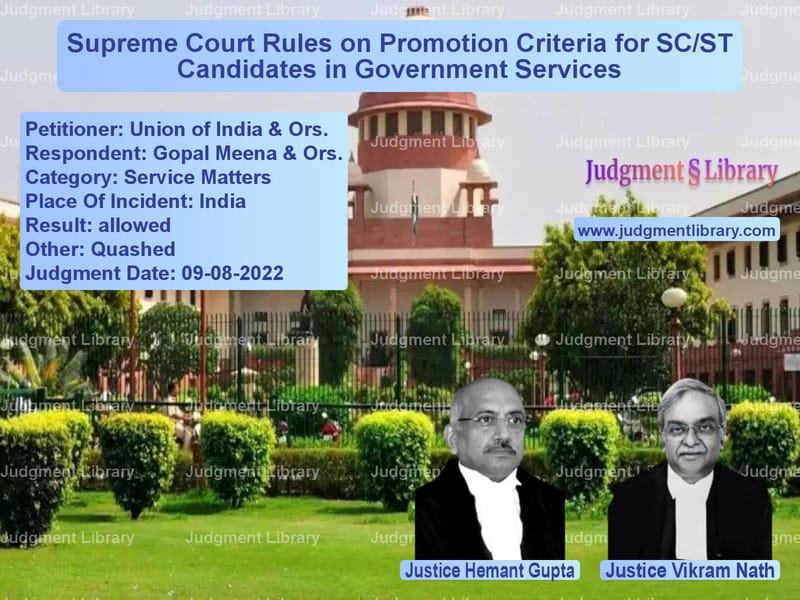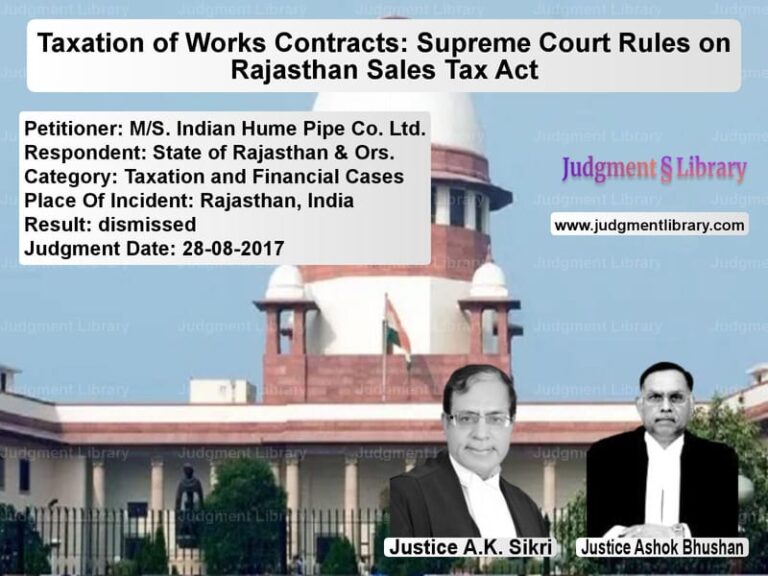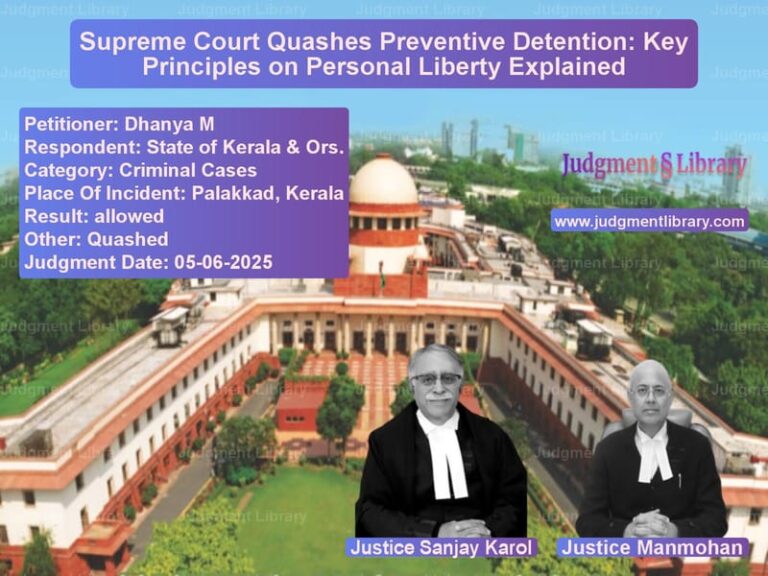Supreme Court Rules on Promotion Criteria for SC/ST Candidates in Government Services
The case of Union of India & Ors. vs. Gopal Meena & Ors. revolves around the promotion criteria for Scheduled Caste (SC) and Scheduled Tribe (ST) candidates in government services. The Supreme Court was tasked with determining whether a separate zone of consideration should be created for SC/ST candidates to fill backlog vacancies in promotions.
Background of the Case
This case involves multiple appeals by the Union of India against judgments by the Central Administrative Tribunal (CAT), the Delhi High Court, and the Punjab & Haryana High Court. The respondents, SC/ST candidates in government services, argued that a separate zone of consideration should be created for their promotions, as there was a backlog of vacancies reserved for them.
The primary contention was that the government’s Office Memorandum (OM) dated 30.9.1983 restricting the zone of consideration to five times the number of vacancies was illegal and in violation of constitutional provisions.
Legal Issues Before the Court
- Whether restricting the zone of consideration for SC/ST candidates to five times the number of vacancies violates reservation policies.
- Whether a separate zone of consideration should be created exclusively for SC/ST candidates to fill backlog vacancies.
- Whether the Central Administrative Tribunal and High Courts correctly interpreted the Office Memoranda governing promotions.
Arguments Presented
Petitioner’s (Union of India) Arguments
- The government argued that restricting the zone of consideration to five times the number of vacancies was necessary for maintaining efficiency in administration.
- It was contended that expanding the zone of consideration for SC/ST candidates would lead to inefficiency in the selection process.
- The Office Memoranda in question had been issued in compliance with the principles of reservation without compromising service efficiency.
Respondents’ (SC/ST Candidates) Arguments
- The respondents contended that the existing restriction unfairly limited their chances for promotion, leading to an increasing backlog of unfilled vacancies.
- They argued that the government’s own policies aimed at ensuring representation for SC/ST candidates were being defeated by the restrictive zone of consideration.
- It was asserted that the judgments in previous cases had already struck down the restrictive policy, and the government was wrong in continuing with it.
Supreme Court’s Observations
On the Constitutionality of the Promotion Policy
The Supreme Court, comprising Justice Hemant Gupta and Justice Vikram Nath, examined the validity of the Office Memoranda governing promotions.
“A zone of consideration that unfairly restricts the number of SC/ST candidates eligible for promotion is unconstitutional and contrary to the reservation policy.”
On the Backlog of Vacancies
The Court acknowledged the respondents’ concerns regarding the backlog of vacancies. It observed:
“The backlog of vacancies for SC/ST candidates arises due to procedural constraints rather than a lack of eligible candidates. The policy must be interpreted in a manner that allows these candidates a fair opportunity for promotion.”
On Efficiency in Service
The Court emphasized that while efficiency in service was important, it should not come at the cost of denying equal opportunity.
“Service efficiency and reservation policy must be balanced. Denying eligible SC/ST candidates the opportunity to be considered for promotion based on an arbitrary zone of consideration is unjustified.”
Judgment and Its Implications
The Supreme Court ruled in favor of the respondents and set aside the restrictive policy on the zone of consideration. The key directives of the judgment were:
- The Office Memorandum restricting the zone of consideration to five times the number of vacancies was struck down.
- The government was directed to implement a promotion policy that ensures adequate representation for SC/ST candidates.
- The judgment reaffirmed the principle that reservation policies should not be diluted through restrictive administrative policies.
Significance of the Judgment
- Strengthens Reservation Policies: The ruling ensures that SC/ST candidates are given a fair opportunity for promotion, reducing the backlog of vacancies.
- Prevents Discriminatory Practices: The decision prohibits the government from imposing arbitrary restrictions that limit the effectiveness of reservations.
- Ensures Administrative Fairness: The judgment mandates that government policies must align with constitutional principles of equality.
Conclusion
The Supreme Court’s ruling in Union of India & Ors. vs. Gopal Meena & Ors. is a landmark decision reinforcing the rights of SC/ST candidates in government promotions. By striking down restrictive policies, the Court has ensured that reservation policies remain meaningful and effective. This ruling sets an important precedent for future cases involving affirmative action and service matters.
Petitioner Name: Union of India & Ors..Respondent Name: Gopal Meena & Ors..Judgment By: Justice Hemant Gupta, Justice Vikram Nath.Place Of Incident: India.Judgment Date: 09-08-2022.
Don’t miss out on the full details! Download the complete judgment in PDF format below and gain valuable insights instantly!
Download Judgment: union-of-india-&-ors-vs-gopal-meena-&-ors.-supreme-court-of-india-judgment-dated-09-08-2022.pdf
Directly Download Judgment: Directly download this Judgment
See all petitions in Promotion Cases
See all petitions in Public Sector Employees
See all petitions in Recruitment Policies
See all petitions in Judgment by Hemant Gupta
See all petitions in Judgment by Vikram Nath
See all petitions in allowed
See all petitions in Quashed
See all petitions in supreme court of India judgments August 2022
See all petitions in 2022 judgments
See all posts in Service Matters Category
See all allowed petitions in Service Matters Category
See all Dismissed petitions in Service Matters Category
See all partially allowed petitions in Service Matters Category







